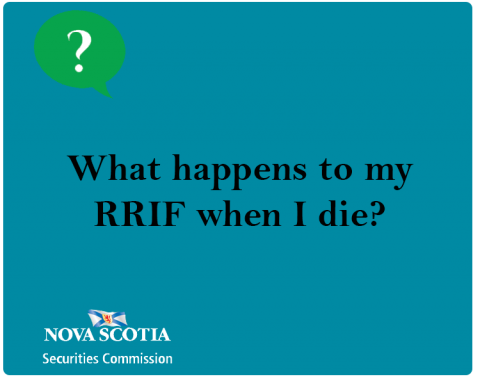Submitted by nsscadmin on

We wrote about Registered Retirement Income Funds (RRIF) in a previous blog post. Since a RRIF is supposed to act as an income stream for the rest of your life after retirement, one of our readers wanted to know what happens to any money remaining in a RRIF after they die. The answer depends on a few things.
First – Have you named a beneficiary for your RRIF?
If you have not named a beneficiary for your RRIF it will be included in the calculation of probate fees on your estate. The value of your RRIF will also be included in your final income tax return.
If you do name a beneficiary for your RRIF it is not included in the calculation of probate fees on your estate. It does not need to be included in your final income tax return as long as your beneficiary is:
-your Spouse;
-a financially dependent child or grandchild under the age of 18; or
-a financially dependent child or grandchild that is infirm.
If your chosen beneficiary is your spouse what happens to your RRIF depends if you have also named your spouse as the successor annuitant of your RRIF.
If your spouse is the successor annuitant, then they simply takeover your RRIF and automatically begin receiving your RRIF payments.
If your spouse is not the successor annuitant, it is a little more complicated. In this circumstance the RRIF is collapsed and all investments within the RRIF are sold. The money may be rolled over to the spouse’s RRSP or RRIF. This has some disadvantages as it may not be a good time to sell the investment, causing a loss of funds. There also may be costs incurred by the sale, and the process can be long and time consuming.
If the beneficiary is a financially dependent child or grandchild, the inheriting child may do the following:
-purchase a term annuity and pay tax on the income they receive;
-transfer the money tax free to an RRSP; or
-transfer the money tax free to an RDSP if they qualify for one.
It can be highly beneficial to the loved ones you leave behind to name a beneficiary for your RRIF and if possible, a successor annuitant. This can save your inheritors considerable time and give you peace of mind that your affairs will be taken care of as you wish.
You should consult with a financial advisor, accountant or lawyer who are familiar with taxation and estate planning.
